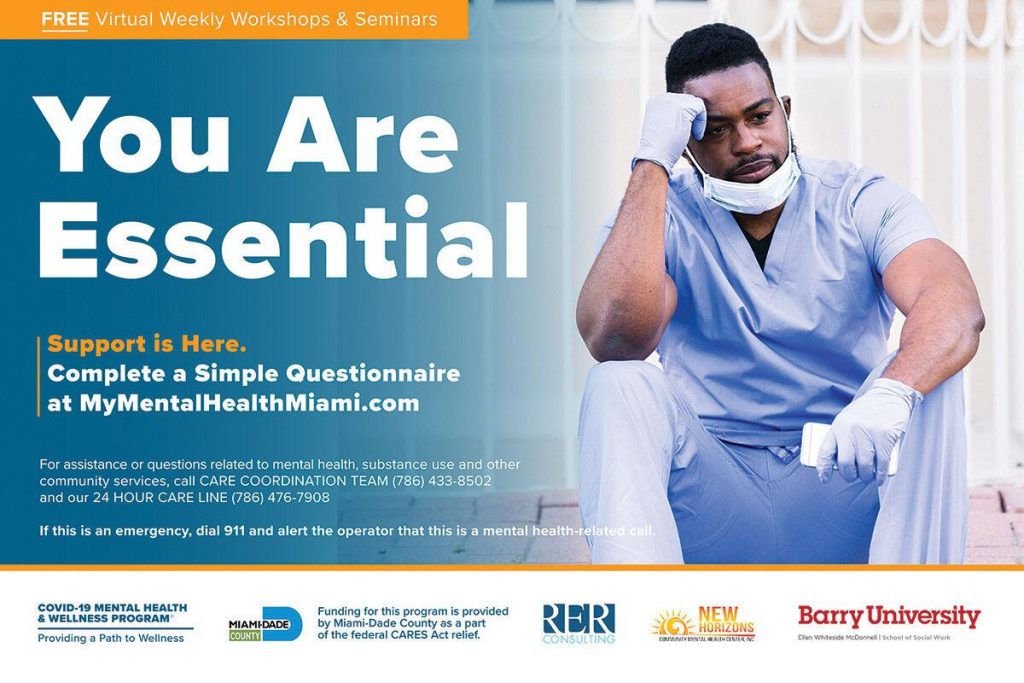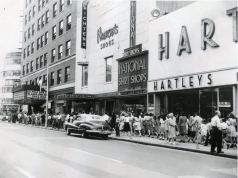The pandemic has negatively impacted everyone’s physical and mental health. Vulnerable populations, including the Black community, have been particularly hard hit.
According to the Centers for Disease Control, African Americans and Hispanics have suffered 2.6 times more cases of COVID-19 than white non-Hispanics, 4.7 times more hospitalizations and 2.1 times more deaths.
Ruban Roberts, CEO of RER Consulting Enterprise, LLC. points out that social justice issues and financial pressure put more stress on Blacks.
“Most essential workers are Black, and putting themselves in harm’s way to do their job,” said Roberts. “They have to do something to sustain their families and this has taken a toll on them.”
So, with federal money from the CARES Act distributed through Miami-Dade County government, RER worked with community collaborators to launch the COVID-19 Mental Health & Wellness Program last month.

“This program is designed to assist Miami-Dade residents that are negatively affected during and post the COVID-19 pandemic,” said Roberts. “We emphasize the wide spectrum of mental health-related issues with disasters and pandemic.”
New Horizons Community Mental Health Center, Barry University and other organizations are part of the program. To enroll, Miami-Dade residents must complete an online survey at MyMentalHealthMiami.com/Survey. Respondents then receive a scorecard measuring their anxiety, stress and depression levels. Those with high indicators of mental health issues will be referred to New Horizons’ care number (786-433-8502) for a free consultation.
“Individuals may be feeling a lot of despair, hopelessness, alienation and traits of insanity and depression,” said Dr. Evalina Bestman, a clinical psychologist and the CEO of New Horizons. “But as a result of their involvement with this program, they will see that there is a path out of that.”
Bestman oversees the entire project and wants as many people to get involved as possible. She urges the Black community to take advantage of the services available to them.
“Our goal is for individuals to get past the stigma that’s connected with mental health, and for communities of color to reach out for professional help to gain an understanding that it’s OK [to do that],” said Bestman. “COVID-19 is hurting the Black community, physically and mentally. Many people in the community can’t afford to have therapy sessions and this program has resources that will help them cope during these hard times.”
The program was conceived in August.
“Serving our community and particularly communities of color, we said, ‘Let’s take a stab at it and get as much information as we can and send it out there,’” said Bestman.
Overcoming the short time frame, Bestman quickly coordinated, organized and released the questionnaire.
“Hopefully the community will respond to it,” she said. “It also really gives us an opportunity to gather information that can be useful in the future.”
Barry University has been working closely with Bestman and her team on the project.
“The pandemic has created such uncertainty that we wanted to create an environment that will improve everyone’s mental well-being,” said Dr. Maria Teahan, assistant professor and associate dean of the School of Social Work.
Teahan helped develop workshops and copresents them. Aware of the social disparities within the area, she, along with two other professors, created four modules for the workshops. They focus on exploring the impact of COVID-19, health and wellness, and grief and loss during a time of crisis.
“Our main goal for each of the modules is to create an organic dialogue around their content that has [participants] really trying to focus on [them],” said Teahan. “Even though we have an overarching theme, we really want to be able to have the flexibility to allow each module to respond to the participants who are in that workshop at the time.”
Workshops are conducted virtually and delivered in English, Spanish and Haitian Creole. They are scheduled twice a week through December.
“The workshops will create a safe space for individuals to get help,” said Teahan. “We want to mitigate the stigma attached to mental health and seeking out mental help services.”
More than 500 people have taken the online survey thus far and that number is expected to grow. However, funding for the program won’t last forever.
“The government has a deadline for those funds to be spent,” said Roberts. “The program will end on Dec. 31, unless there’s an extension.”
For now, the program is continuing its spread across underserved communities.
“Your mental help comes first,” said Bestman. “We want to help you cope with past trauma, such as racial injustices, social problems, suicidal thoughts, stress, depression and many more issues.”
This story first appeared in The Miami Times.
































